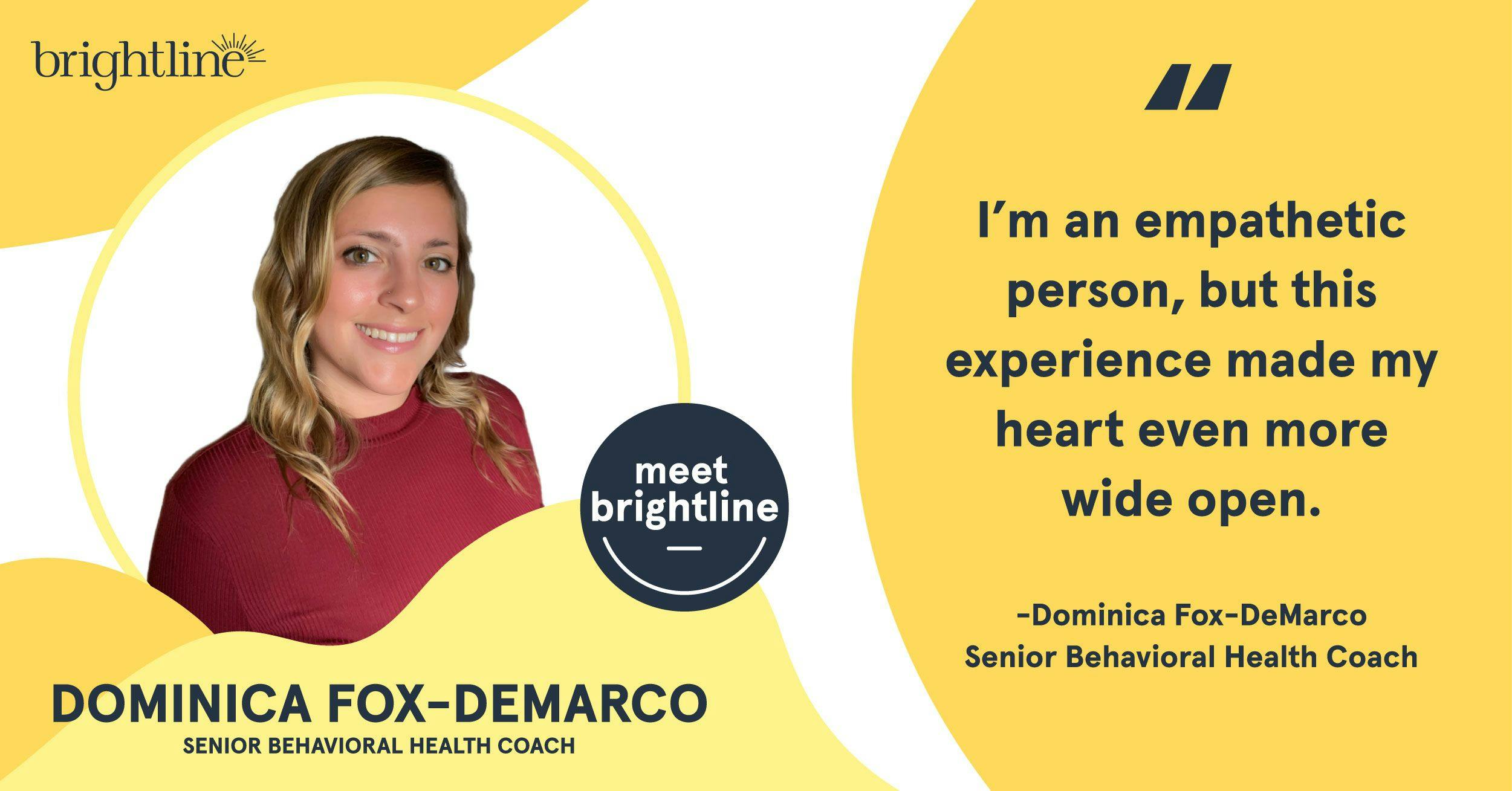“This experience has made my heart even more wide open” — Brightline coach spotlight

By Brightline team, Nov 9, 2021
Pregnancy loss is a traumatic life experience that can leave expectant parents feeling depressed and vulnerable. Unfortunately, the traditional health care system often doesn’t provide the mental health support that grieving parents need to help cope with such a significant loss.
Brightline’s senior behavioral health coach Dominica Fox-DeMarco knows this all too well. Her experience with pregnancy loss included a mental health struggle that required help to heal. Her story is an inspiring account of how therapists and coaches experience their own life challenges, and how they overcome them with the same care they provide their own patients.
In this interview, Dominica shares her very personal experience, the missing connection between traditional and behavioral health care, and the ways her trauma has made her a better coach.
What inspired you to become a coach?
For years, I knew I wanted to go into therapy. Earning my degree in clinical psychology gave me a taste of therapy, then I worked as a case worker for 12 years dealing with very intense situations. The stress of that role left me feeling burned out, despite being grateful for the experience.
While working as a case worker, I found myself at a crossroads and questioning my true calling. I stumbled upon a master’s coaching program, and it spoke to me. I was also pursuing a yoga certification at the time, so I was at a point where I was focused on taking better care of myself. In a sense, that feeling of burnout served as the catalyst for becoming a coach.
What brought you to Brightline?
I’ve always loved working with children and teens — they give me hope as I navigate my own fertility journey. They’ve been through so much during the pandemic, dealing with a new normal and many struggling with that day-to-day. It gives me a sense of pride to see kids overcome obstacles and thrive.
Plus, I love helping to create something meaningful in the digital behavioral health care space — the high level of quality care that Brightline provides, and its family-focused approach.
Tell us more about your personal experience with loss and mental health.
In January 2020, my partner and I decided we were ready to start a family. That summer, we learned I was pregnant. Everything looked great! We were elated. Fast forward a few weeks, and we decided to tell our families. Unfortunately, less than a week later, I began spotting and ultimately miscarried.
We were devastated. I took two weeks of bereavement leave, during which my gynecologist became cold. I felt treated like a number, and wasn’t offered any support. Sadly, later that year we experienced our second pregnancy loss. While it happened at an earlier stage, in some ways it was more traumatizing since it made us question if something was wrong with me.
Through both traumas, mental health support wasn’t offered. It simply wasn’t part of the process from a health care perspective. Even something basic to help steer us through the ordeal, like a pamphlet on coping skills, wasn’t provided.
As a coach, were you able to help yourself with self care?
Being an advocate for myself is what helped me heal. I found resources to help me through, researched tests, and found a new gynecologist who showed empathy.
The biggest help was going to therapy. Being a coach myself did help, and I feel fortunate to have that perspective. But I still needed help to sort through my feelings. I also read books about loss, did a lot of journaling, and joined social media groups — all in an effort to normalize it and talk openly.
As someone who’s gone through it, who is also a behavioral health coach, how could traditional health care be changed to better support those who have experienced pregnancy loss?
The key is better integration with mental health care. Patients who have experienced pregnancy loss should be referred to someone in the mental health field to help them cope, as complementary care to physical care. A holistic approach is essential, looking at the whole person and taking care of all their needs. Since pregnancy loss is linked to PTSD and depression, there should be a health care professional checking in regularly.
I found my own path to healing, but it shouldn’t be that way. Since our pregnancy losses, my husband and I have taken a pause, but remain hopeful that we’ll be blessed with a child someday.
How has this experience impacted your work as a coach in the behavioral health field?
I’m an empathetic person, but this experience made my heart even more wide open. It’s helped me empathize more, and I’m more in tune with people’s needs. I also have a greater appreciation for Brightline’s approach to customized care and unlimited timeline. That’s what I needed, and as a Brightline coach, I see the value in carefully developing a specific program and seeing it through until real results are apparent.
Dominica Fox-DeMarco is a senior behavioral health coach at Brightline. She is a national board certified health and wellness coach who holds a master’s in health and wellness coaching and a bachelor’s in clinical psychology. She has worked in the digital mental health space for three years, and previously worked as a case manager in the social services and mental health fields for 12 years.